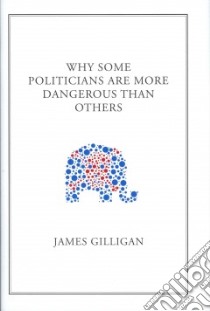Why Some Politicians Are More Dangerous Than Others - 9780745649818
Un libro in lingua di James Gilligan edito da Polity Pr, 2011
- € 58.00
- Il prezzo è variabile in funzione del cambio della valuta d’origine
"The Republicans and Conservatives are bad for your health. They should come with the same warning that took years to become emblazoned on cigarette packets. This book goes a long way in working towards that."
Tribune
Politicians and the political process, even in ostensibly democratic countries, can be deadly. James Gilligan has discovered a devastating truth that has been "hiding in plain sight" for the past century - namely, that when America's conservative party, the Republicans, have gained the presidency, the country has repeatedly suffered from epidemics of violent death. Rates of both suicide and homicide have sky-rocketed. The reasons are all too obvious: rates of every form of social and economic distress, inequality and loss - unemployment, recessions, poverty, bankruptcy, homelessness also ballooned to epidemic proportions. When that has happened, those in the population who were most vulnerable have "snapped", with tragic consequences for everyone.
These epidemics of lethal violence have then remained at epidemic levels until the more liberal party, the Democrats, regained the White House and dramatically reduced the amount of deadly violence by diminishing the magnitude of the economic distress that had been causing it.
This pattern has been documented since 1900, when the US government first began compiling vital statistics on a yearly basis, and yet it has not been noticed by anyone until now except with regard to suicide in the UK and Australia, where a similar pattern has been described.
This book is a path-breaking account of a phenomenon that has implications for every country that presumes to call itself democratic, civilized and humane, and for all those citizens, voters and political thinkers who would like to help their country move in that direction.
Informazioni bibliografiche
- Titolo del Libro in lingua: Why Some Politicians Are More Dangerous Than Others
- Lingua: English
- Autore: James Gilligan
- Editore: Polity Pr
- Collana: Polity Pr (Hardcover)
- Data di Pubblicazione: 02 Agosto '11
- Genere: POLITICAL SCIENCE
- Pagine: 229
- ISBN-10: 0745649815
- EAN-13: 9780745649818


